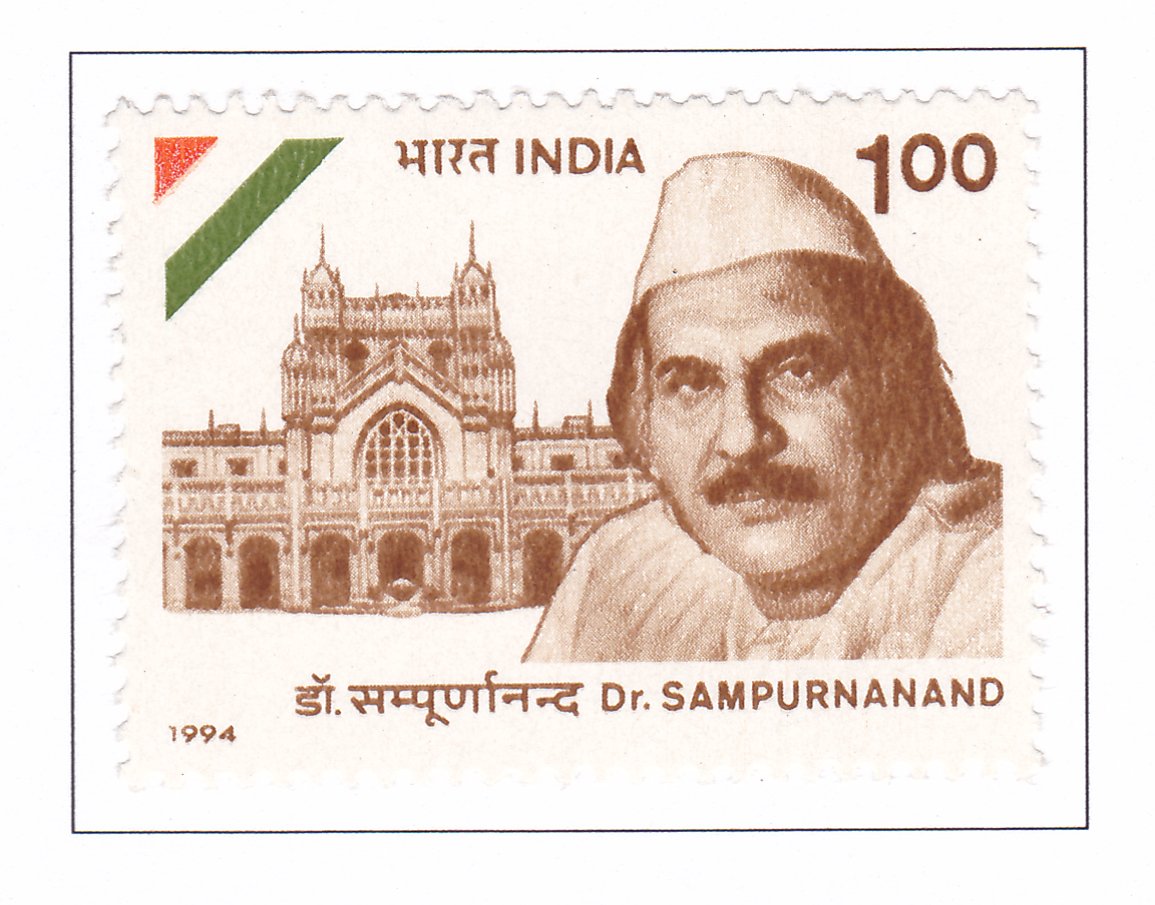Dr. Sampurnanand

Technical Data
| Date of Issue | January 10, 1994 |
|---|---|
| Denomination | Rs. 1 |
| Quantity | 600,000 |
| Perforation | comb 13½ x 13 |
| Printer | Security Printing Press, Nashik |
| Watermark | No Watermark |
| Colors | Multicolor |
| Catalog Codes |
Michel IN 1416 Stamp Number IN 1478 Yvert et Tellier IN 1214 Stanley Gibbons IN 1566 |
| Themes | Commemoration | Famous people | Headgear | Men | Politicians |
Table of Contents
Dr. Sampurnanand
Early Life and Education:
- Birth: Renowned nationalist, freedom fighter, thinker, and scholar.
- Early Achievements: By the age of 10, he was well-read and reached matriculation level at 14. Despite being too young to sit for the exam, he utilized his time by reading extensively at the Carmichael Library in Kashi.
Contributions to the Freedom Movement:
- Imprisonment: Spent nearly five years in prison during the freedom struggle.
- Influence: Greatly influenced by Mahatma Gandhi and actively participated in the freedom movement.
Literary and Scholarly Pursuits:
- Books and Writings: Authored numerous books on Indian philosophy, culture, history, astrology, socialism, and other subjects. Notable works include:
- “Dharamvir Gandhi” (a life sketch of Mahatma Gandhi during his South African campaign)
- “Maharaj Chhatrasal”
- “Bharat Ke Deshi Rajya”
- “The Individual and the State”
- “Aryan Ka Adi Desh”
- Journalism: Contributed as an editor to journals and newspapers like “Maryada,” “Jagran,” “Aaj,” and “Today.”
Political Career and Contributions:
- Congress Socialist Party: Founded in 1934, with Dr. Sampurnanand presiding over its first session in Bombay.
- Ministerial Roles:
- Member of the first Ministry in the United Provinces (1936).
- Minister in charge of Education, Labour, and Information (1946-60).
- Governor of Rajasthan (1962-67).
- Educational Reforms: Advocated for vocational and military education in schools. Pioneered the concept of ‘open jails.’
- Movements: Led the cane-growers movement and the Siswa Bazar episode, becoming a mass leader during the Civil Disobedience Movement.
- Legislative Tact: Demonstrated political acumen during the Badrinath Temple Bill in the U.P. Legislature.
- Basic and Adult Education: Promoted basic and adult education as the Minister of Education in the U.P. Cabinet.
Philosophical and Religious Views:
- Approach to Religion: Though outwardly orthodox, he maintained a rational and liberal approach to religion. Emphasized that a man’s religion influences his entire life, and studying it is essential for understanding one’s personality.
Legacy and Recognition:
- Lifestyle: Lived a quiet, austere, and philosophical life, avoiding public acclaim or recognition.
- Contributions: Played a significant yet understated role in India’s freedom movement and the making of modern India.
- Commemoration: The Department of Posts issued a commemorative postage stamp to honor Dr. Sampurnanand’s immense contributions.
Summary:
Dr. Sampurnanand was a multi-faceted personality—a freedom fighter, scholar, writer, politician, and education reformer. His contributions spanned various fields, including Indian philosophy, culture, history, and socialism. Known for his rational approach to religion and dedication to education, he left an indelible mark on India’s freedom movement and post-independence development. The nation remembers him through a commemorative postage stamp issued by the Department of Posts.
